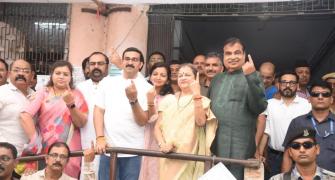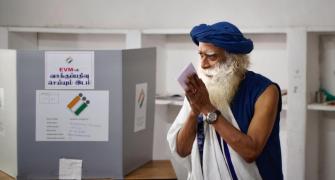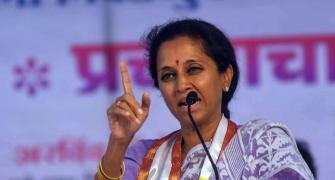 It's the International Day of UN Peacekeepers. They were -- and are -- there everywhere across the globe. Refugees were taken home safely and children to school. They trained police, supported elections, built bridges, repaired schools, protected women from sexual violence, disarmed ex-combatants and helped flood victims. The Blue Helmets, as they are called because of the sky-blue headgers they wear, have a lot more to do.
It's the International Day of UN Peacekeepers. They were -- and are -- there everywhere across the globe. Refugees were taken home safely and children to school. They trained police, supported elections, built bridges, repaired schools, protected women from sexual violence, disarmed ex-combatants and helped flood victims. The Blue Helmets, as they are called because of the sky-blue headgers they wear, have a lot more to do.
Though the very existence of the world body is debatable, there are no doubts over its peacekeeping force's humanitarian work on our planet.
UN officials marked the International Day of UN Peacekeepers by voicing gratitude for the work that Blue Helmets do every day in dangerous missions worldwide and mourning those who have fallen in service during the last six decades.
"Peacekeeping has developed into a flagship enterprise of our organisation," secretary-General Ban Ki-moon said in an official message to mark the Day on Thursday, which celebrated the 60th anniversary of the establishment of the first UN peacekeeping mission.
More than 110,000 uniformed personnel from 115 countries currently serve in 20 operations around the world.
Ban said he had observed first-hand in his travels over the past year the impact the military troops and police officers had in countries trying to rebuild after war.
''I have seen refugees returning home, children heading back to school, citizens once again secure under the rule of law. I have seen whole societies moving, with the help of the peacekeepers, from devastation to rejuvenation," the UN chief said.
The secretary-General said peacekeepers perform an array of tasks well beyond any narrow definition of their job, including training police, supporting elections, building bridges, repairing schools, protecting women from sexual violence, disarming ex-combatants and helping flood victims.
''Thanks to their efforts, life-saving humanitarian assistance can be delivered and economic development can begin,'' Ban said.
In his message, General Assembly President Srgjan Kerim lauded 'the professionalism, dedication and courage' of the peacekeepers.
He noted that the UN has recently approved the establishment of two new missions in Sudan's Darfur region and in the neighbouring countries of Chad and the Central African Republic.
Kerim said the demands of UN peacekeeping had become so complex over the years that it was necessary last year to set up the new Department of Field Support.
''Our job in the General Assembly is to support the peacekeepers in political, financial and logistical aspects, so that they can get their jobs done on the ground,'' he said.
In a taped message, the UN Messenger of Peace and actor-director George Clooney said the world owed the peacekeepers a debt of gratitude for the
''These brave men and women go to places where few others will and risk their lives for peace. I am proud to continue my work with the UN to remind those in the United States and around the world that peace is not easy and, like war, must be waged,'' he said.
Under-Secretary-General for Peacekeeping Operations Jean-Marie Guéhenno, in remarks to a wreath-laying ceremony at UN headquarters in New York, stressed that the UN cannot meet the demands on its own.
"'We must build strong partnerships to ensure that we can move from providing initial security to rebuilding shattered societies," he said, adding, "'Our real impact on the ground will determine the support we have from the people we serve, and that, in the end, is the core of the United Nations."
At least 2,400 peacekeepers have died in service since 1948 and last year alone 90 people lost their lives, Guéhenno said.
"'We pay tribute to their sacrifice and dedication in pursuit of the noble goals of the United Nations.'' Later, he told a news conference that it was important that UN peacekeeping operations always be established under clear mandates and with strong support from member states so that the incoming mission is not viewed as another party to the conflict.
"'We may become the victim of our own success if peacekeeping is seen as the instrument that can be applied to any situation. That can be very dangerous. We must not succumb to the illusion that military deployment could substitute for a solid political process," he said.
Under-Secretary-General Susana Malcorra, head of the Department of Field Support, stressed it was vital to lay the groundwork for any peacekeeping mission so that resources can be mobilised rapidly to deal with potentially fast-moving situations.
In other events to mark the Day, ceremonies, multimedia exhibitions and other events are being held on Friday at UN offices around the world, including in Geneva, Cyprus, Kenya, Lebanon, Liberia, Sudan, Thailand and Timor-Leste. According to information received at UN headquarters in New York, a number of messages of support and solidarity were sent to peacekeepers.
Wreath-laying ceremonies for fallen peacekeepers also took place in many other countries with a UN presence, including Kenya, Lebanon, Liberia and Thailand.
The Day is the exact anniversary of the date in 1948 when the Security Council established the first UN peacekeeping operation, the UN Truce Supervision Organisation to monitor an armistice between Israel and its neighbours.
Image: Let the flag fly higher : Peacekeepers with the United Nations Interim Force in Lebanon (UNIFIL) during a celebration marking the International Day for the United Nations Peacekeepers in the Lebanese town of Naqura on May 29.
Photograph: MAHMOUD ZAYAT/AFP/Getty Images. Tesxt: UNI








